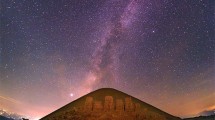Abstract
IF there is something noteworthy in every tercentenary, in the conjunction of two such events in a single year there is something far more remarkable. The deatl: of Galileo and the birth of Newton are important enough when considered separately. A great man has played his part and leaves the stage; or another enters on a career no less brilliant. Both episodes are impressive; that one followed the other within a space of twelve months adds to the significance of both. The two lives cover the whole of the seventeenth century and by themselves make it illustrious. The period between the birth of Galileo and the death of Newton was longer-no less than 163 years-running from the year which also saw the birth of Shakespeare in the reign of the Tudor Queen Elizabeth to the death of the first Hanoverian king. If that were all, it would be nothing extraordinary; old Parr himself, who is reputed to have joined the reigns of Richard III and Charles I, covered nearly as long a span in a single life. But the age of Galileo and Newton was marked by an altogether unusual development of the human mind, and though this growth was far from being the work of two men, none contributed more powerfully to decide the extent and direction of its course than these two.
This is a preview of subscription content, access via your institution
Access options
Subscribe to this journal
Receive 51 print issues and online access
$199.00 per year
only $3.90 per issue
Buy this article
- Purchase on Springer Link
- Instant access to full article PDF
Prices may be subject to local taxes which are calculated during checkout
Similar content being viewed by others
Rights and permissions
About this article
Cite this article
PLUMMER, H. GALILEO GALILEI, 1564–1642. Nature 149, 206–208 (1942). https://doi.org/10.1038/149206a0
Issue Date:
DOI: https://doi.org/10.1038/149206a0
Comments
By submitting a comment you agree to abide by our Terms and Community Guidelines. If you find something abusive or that does not comply with our terms or guidelines please flag it as inappropriate.



